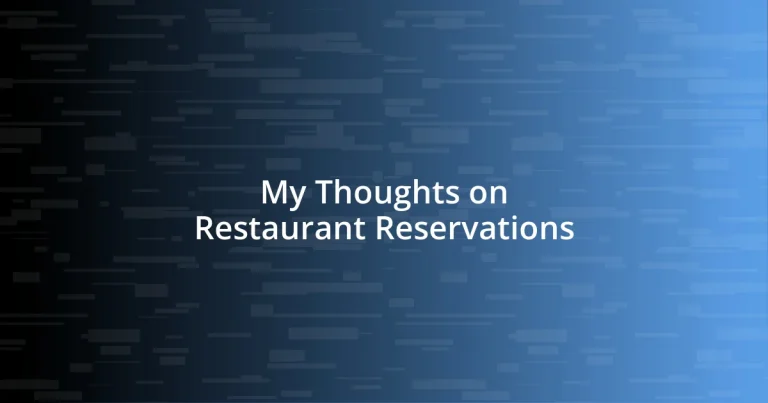Key takeaways:
- Making restaurant reservations guarantees seating, reduces wait times, and enhances dining experiences through better service.
- Different types of reservations, such as traditional, walk-in, pre-paid, and group reservations, cater to varying preferences and dining situations.
- Understanding and adhering to no-show policies is essential, as they protect both diners and restaurants from financial loss and scheduling conflicts.
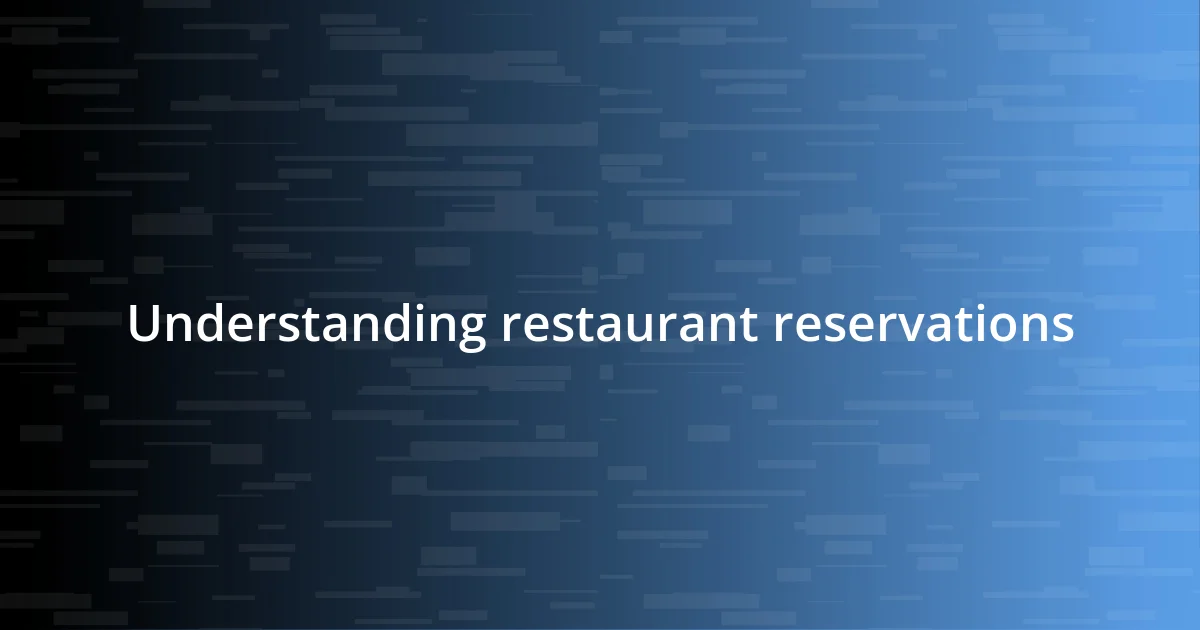
Understanding restaurant reservations
Reservations at restaurants serve as a key lifeline for both diners and establishments. I remember a night when my friends and I wanted to try a popular new spot in town without a reservation. We ended up waiting over an hour, watching others enjoy their meals while we stood there, which felt incredibly frustrating. How often have you been in a similar situation, eager to indulge in culinary delights, only to be thwarted by the lack of a simple booking?
Dining out, especially at trendy places, often requires planning ahead. I’ve learned the hard way that securing a reservation not only guarantees a table but can also enhance the overall experience. Imagine this: you’ve made an effort to dress up and are excited for a delightful evening, only to have it marred by the stress of securing a seat. Isn’t it nicer to stroll in knowing your spot is waiting?
Furthermore, understanding the dynamics of restaurant reservations can really shift your dining experiences. Some establishments prioritize reservations during peak hours, which often means a smoother experience for diners—less waiting and more enjoying. It makes me wonder, in this age of instant gratification, how do you choose between the excitement of spontaneity and the assurance of a reservation? Personally, I’ve found that balancing both can often lead to the best of times.
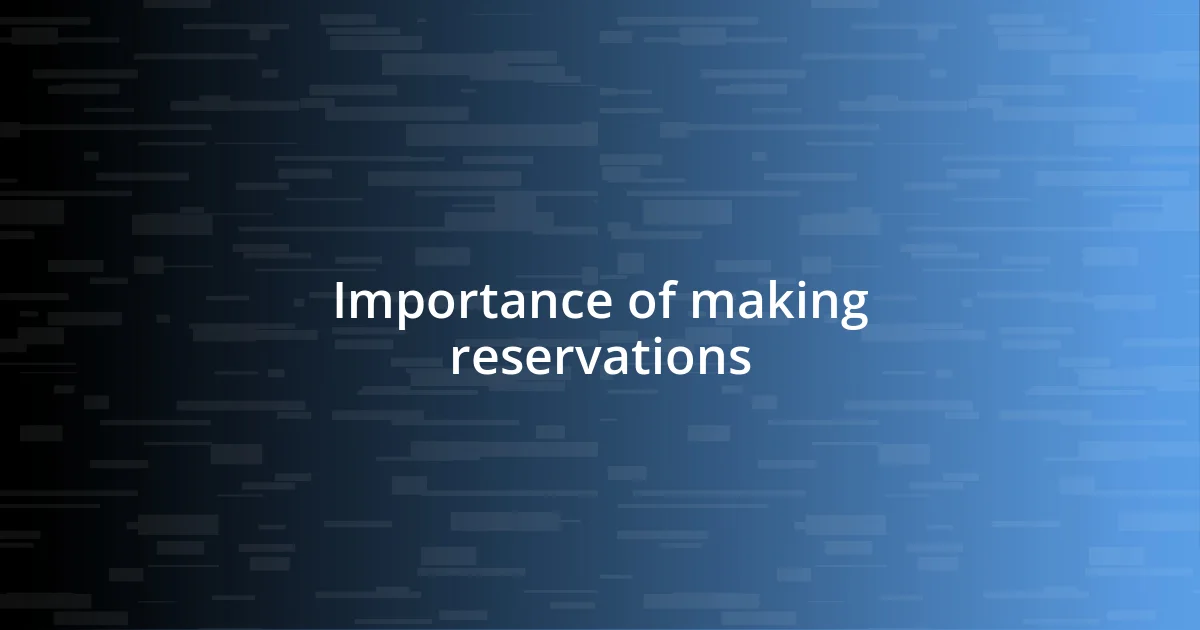
Importance of making reservations
Making reservations is crucial for a seamless dining experience. I recall a time when I decided to surprise my partner with dinner at a critically acclaimed restaurant. I was so caught up in the excitement that I neglected to book a table—big mistake! We arrived, hopeful, only to discover a two-hour wait. That evening quickly turned from romantic to disheartening. Knowing you have a reservation eliminates that stress and sets the stage for a memorable night.
Here are a few key reasons why making reservations is important:
- Guaranteed Seating: A reservation ensures you have a spot, especially during peak hours.
- Reduced Wait Times: With a reservation, you bypass long waits, allowing you to enjoy your dining experience right away.
- Better Service: Restaurants can prepare better for guests who have reserved, often leading to personalized service.
- Peace of Mind: Knowing you have a table reserved allows you to focus on what really matters—enjoying the food and the company.
This simple act of planning can make all the difference, transforming what could be a frustrating evening into something truly enjoyable.
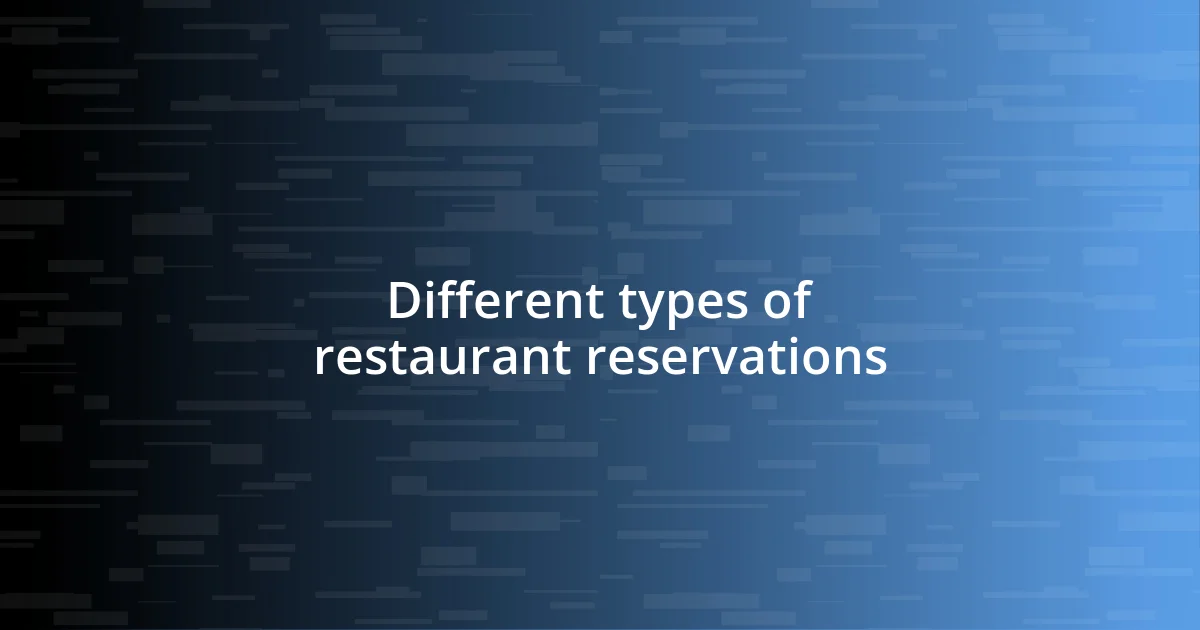
Different types of restaurant reservations
Reservations come in various forms, each offering unique benefits. I’ve often encountered traditional reservations, where you call ahead or book online, typically ensuring a specific time and table. However, there’s also the emergence of walk-in policies at some casual eateries, which cater to those who prefer spontaneity. Just last month, my friends and I stumbled across a cozy little place that only accepted walk-ins. The thrill of the unexpected made it a delightful adventure, proving that sometimes spontaneity can bring unexpected joy.
Another interesting type is the pre-paid reservation. This system requires diners to pay in advance, usually in exchange for a special tasting menu or exclusive dining experience. I remember experiencing this at a high-end restaurant during a special occasion. While it felt a bit unconventional to pay upfront, the meal was extraordinary, and knowing we had secured our place made the evening feel extra special. This type of reservation can be a fantastic option for upscale dining.
Finally, there are group reservations, which I find particularly useful for celebrating occasions. When coordinating a birthday dinner for a close friend, having a reserved table for a larger group proved invaluable. It allowed us to gather comfortably, avoiding the stress of waiting for sufficient seating during busy times. Each reservation type offers its own flavor of convenience, which can greatly enhance the dining experience based on your plans for the night.
| Type of Reservation | Description |
|---|---|
| Traditional Reservation | Secures a specific table and time, ideal for planned dining. |
| Walk-In Policy | No reservation needed, perfect for spontaneous outings, but with potential wait times. |
| Pre-Paid Reservation | Requires upfront payment, often for special menus, providing exclusivity and peace of mind. |
| Group Reservation | Designed for larger parties, ensuring seating accommodates all guests comfortably. |
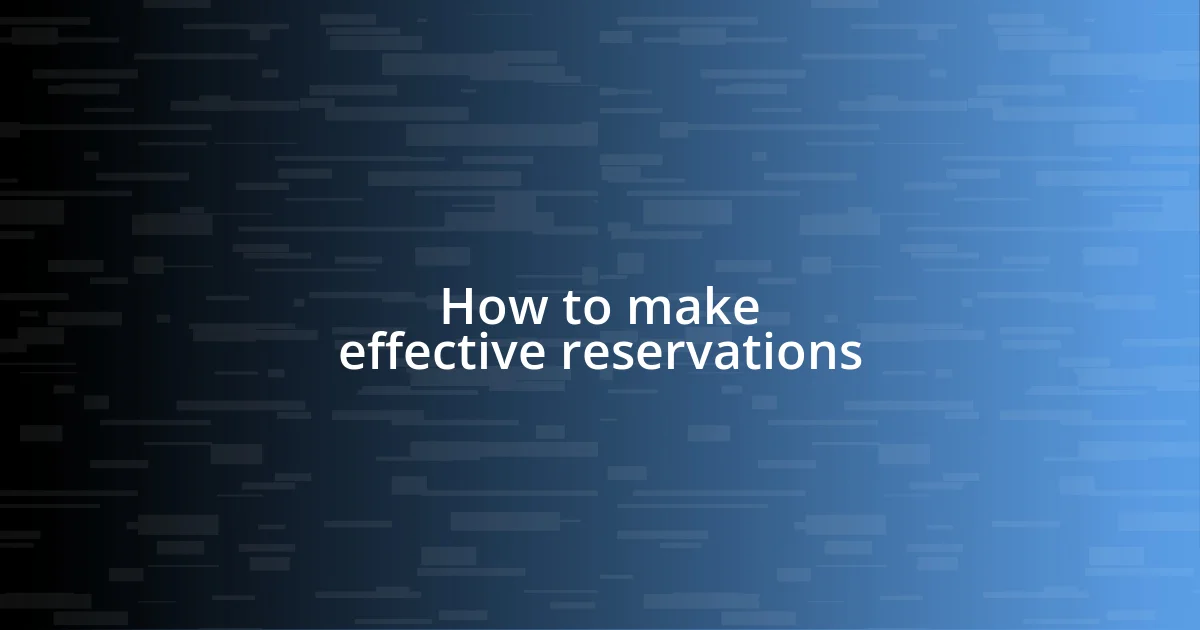
How to make effective reservations
When making effective reservations, clarity is key. I learned this the hard way when I once booked a table for three but accidentally noted it for two. When we arrived, the staff was accommodating, but the experience felt a bit awkward—a small mix-up that could’ve been avoided with clear communication. I always double-check the details before confirming the reservation, both for the time and the party size, to ensure a smooth experience.
I also find that timing can greatly impact your dining experience. Opting for reservations during off-peak hours can lead to a quieter, more intimate atmosphere. On one occasion, I reserved a table for 5 PM at a popular bistro, and it felt like we had the place to ourselves. The ambiance was serene, allowing for deeper conversations without the distraction of a bustling crowd. Have you ever tried dining during these quieter times? You might be pleasantly surprised by how enjoyable it can be.
Lastly, I recommend being open to flexibility with your reservation. Sometimes, restaurants have limited availability for your desired time, but I’ve discovered that adjusting by even just 30 minutes can open up better options. I remember once having to book a table an hour later than I initially wanted, but that slight shift led us to an unforgettable evening with personalized service and even a surprise dish recommended by the chef. It’s all about embracing the possibilities!
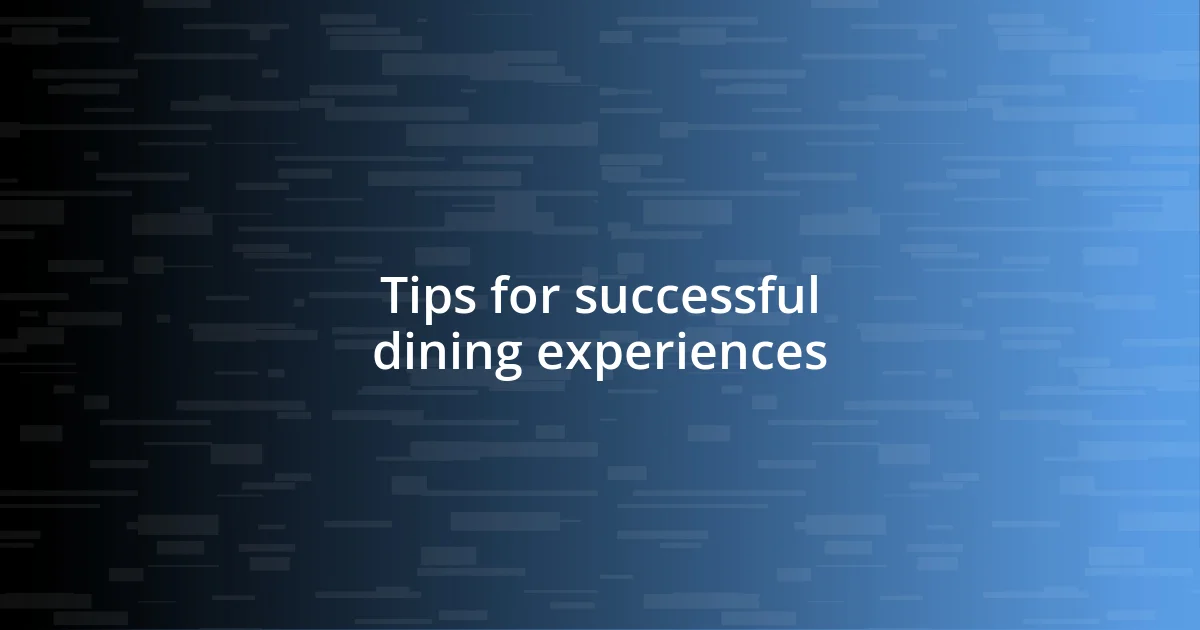
Tips for successful dining experiences
When aiming for a successful dining experience, I’ve learned that arriving a bit early can set the right tone. I remember a time when my friends and I arrived ten minutes ahead of our reservation at a bustling restaurant, and to our delight, we were promptly seated at a lovely table. This extra time allowed us to soak in the ambiance and even chat with the staff about the evening’s specials, enhancing our overall experience. Have you ever noticed how a few extra minutes can sometimes create the perfect vibe?
Another point I can’t emphasize enough is the importance of engaging with your server. On a recent outing, my server was not only knowledgeable but genuinely passionate about the menu. I found myself asking questions about dishes I wouldn’t normally try. His enthusiasm led me to order something completely outside my comfort zone, and it turned out to be the highlight of the meal! How often do we hold back from exploring new flavors? Opening up that line of communication can really transform an ordinary dinner into an unforgettable culinary adventure.
Finally, I believe that managing expectations plays a pivotal role in enjoying your dining experience. There was a time when I dined at a trendy restaurant known for long waits, and I went in dreading the wait. However, I chose to view it as an opportunity to enjoy a drink at the bar and strike up a conversation with other patrons. That slight shift in mindset turned a frustrating wait into one of the most enjoyable evenings I’ve had, proving that sometimes, the journey is just as delightful as the destination. How do you handle waiting when you’re eager to dig in?
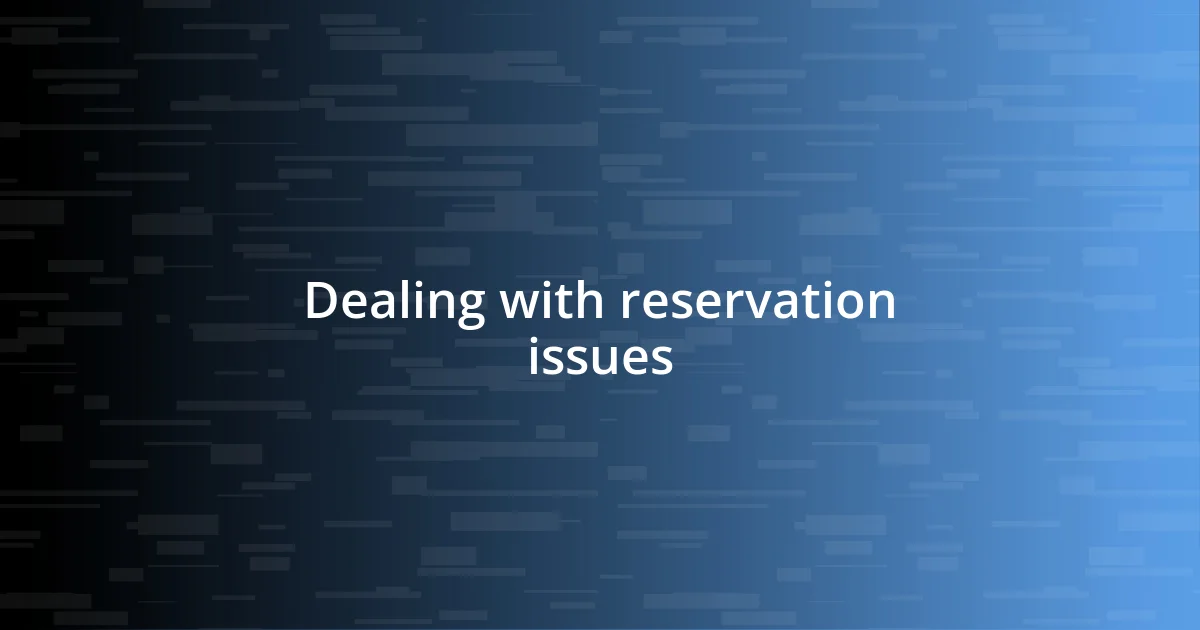
Dealing with reservation issues
Dealing with reservation issues can be a bit of a dance, and my experience has shown me the best way to handle it is with grace and patience. I recall a time when I arrived at a restaurant only to find my reservation missing from the system. Instead of panicking, I calmly spoke to the host, who sincerely apologized for the oversight and found a workaround. It reminded me that a little kindness can go a long way, especially when mistakes happen.
Another challenge I’ve faced is having my reservation confirmed but then being told upon arrival that the table wasn’t ready. In one instance, my friends and I were asked to wait while the table was being cleared. Rather than letting frustration set in, we used that time to enjoy some drinks at the bar. It turned into an unexpected happy hour, and we ended up chatting with the bartender about the restaurant’s signature cocktails. Have you ever taken a frustrating situation and turned it into something enjoyable? I find that perspective makes a huge difference.
Finally, there are those occasions when a simple misunderstanding arises, like when my reservation got mixed up with another party on a busy night. In that moment, it felt like a setback, but I chose to laugh it off and suggest that we all share tales of our favorite dining experiences while waiting. It turned out to be a delightful chat with the other group, leading to new friendships and a night I wouldn’t have traded for any hassle-free experience. Isn’t it interesting how challenges can sometimes lead to unexpected joys?
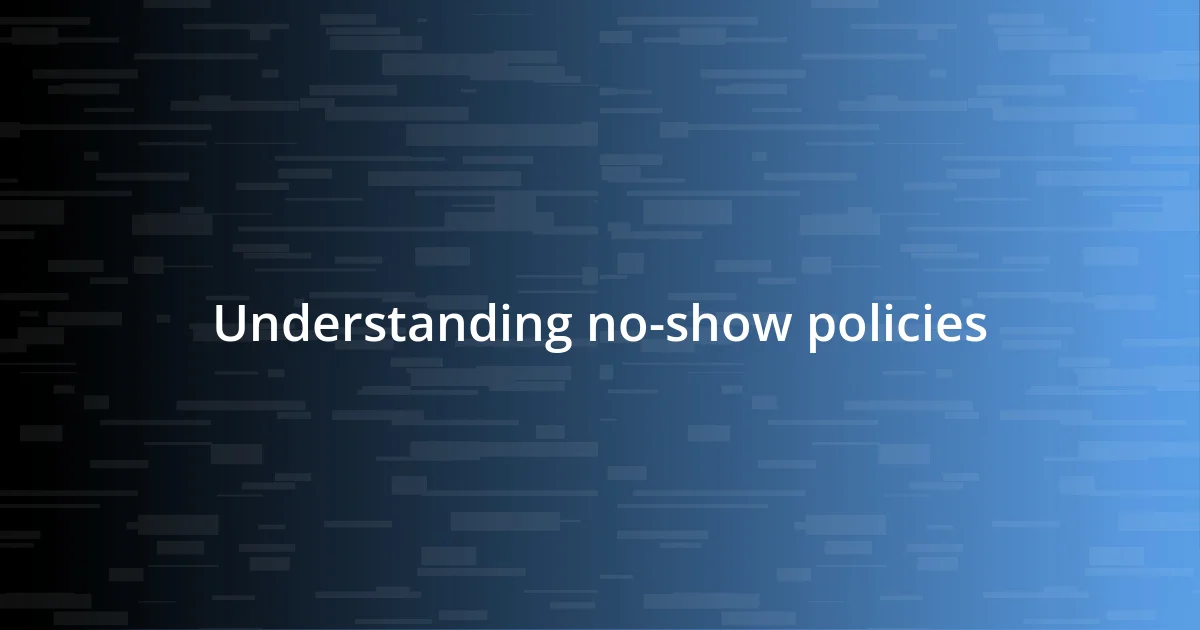
Understanding no-show policies
Understanding no-show policies is crucial for both diners and restaurants. I once faced a situation where I forgot to cancel a reservation for a popular brunch spot. Arriving with friends to find that our table was forfeited made me realize the significance of these policies. It’s not just about a missed meal; restaurants often turn away other guests based on reserved tables and that can hurt their bottom line.
In my experience, each restaurant has its own approach to no-show policies. Some implement strict penalties, like charging a fee for no-shows, while others might be more lenient. I vividly remember a fine-dining restaurant that charged a nominal fee for no-shows, and while I was initially annoyed, I understood their perspective. This fee helps ensure that the restaurant can continue to operate smoothly, allowing them to serve other guests who might have wanted to dine at that moment.
What’s important to remember is that these policies are usually put in place to maintain the integrity of the dining experience. The last thing a restaurant wants is to scramble last minute to fill a table. I’ve often thought about the experience of a restaurant owner; I can only imagine the time, effort, and investment that goes into preparing for diners. So, next time you have to cancel, consider sending a quick message. It not only shows gratitude for their service but helps them serve their other guests better. Have you ever been on the other side, managing a booking? How did you handle it?












